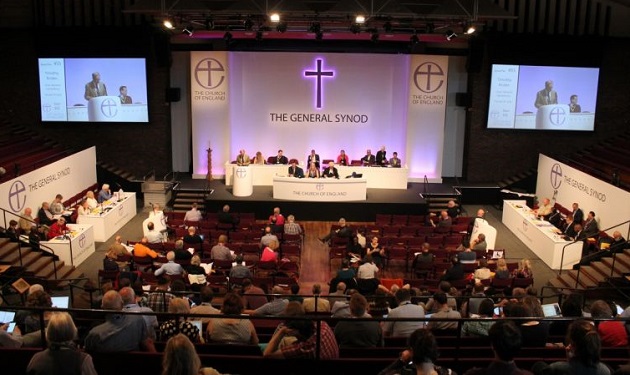The General Synod of the Anglican Church also backed a ban on conversion therapy. Some members say deep theological discussions are being left out.
 A Church of England Synod meeting. / CofE
A Church of England Synod meeting. / CofE
The Church of England took two new steps in regards to the exuality and LGBT debate during its General Synod, held this past weekend in York.
While the gay pride parades where happening in London on Saturday, the Church of England voted to officially ban conversion therapies.
The Synod endorsed a statement by several professional bodies which states that conversion therapy “has no place in the modern world. It is unethical and harmful and not supported by evidence.”
The Archbishop of York, John Sentamu, said that a ban on the “theologically unsound” practice.
SAME-SEX ATTRACTION AND FAITHFULUNESS TO BIBLE
During the debate, some members expressed their concerns that this ban would stop same-sex attracted people willing to stay faithful to the historic biblical understanding of sexuality from being cared for.
Rvd. Sean Doherty (a member of ‘Living Out’) asked to include an amend saying that pastoral care, prayer ministry and professional counselling were “legitimate means of supporting individuals who choose them freely, provided that they respect the property dignity of human beings, and do not involve coercion or manipulation or make unwarranted promises about the removal of unwanted feelings”. This amendment was rejected.
“WELCOME AND AFFIRM” TRANSGENDER PEOPLE
On Sunday, the Synod went on to vote in favour of the government of the Church to “welcome and affirm” transgender people.
Bishops will now consider to create liturgical materials “to mark a person's gender transition.”
According to the Church Times, “a special majority of two-thirds was required in each House for the motion to be passed, and was obtained: Bishops 30 to two, with two abstentions; Clergy 127 to 28, with 16 abstentions; and Laity 127 to 48, with eight abstentions.”
Introducing the motion, Revd Christopher Newlands said “family and friends can cause an increased risk of suicide, but so can churches,” he said. “Trying to call gender dysphoria ‘fake science’ and persuading people not to transition or, worse, to try and reverse the process, is causing irreparable damage to people’s lives and wellbeing.”
Other Synod members, such as Anne Foreman, said that God had made humanity, “male and female” not “male or female”.
THEOLOGICAL DEBATE MISSING
An amendment from Nicholas Land (York), which suggested that the motion would raise “substantial theological and pastoral issues” that the Church had not yet considered, was lost.
Archbishop Sentamu recognised the theological and liturgical concerns raised by members, but assured the Synod that the House of Bishops would conduct much work before any liturgy was produced.
WHAT IS THE GENERAL SYNOD?
The General Synod of the Church of England (Anglican Communion) “considers and approves legislation affecting the whole of the Church of England, formulates new forms of worship, debates matters of national and international importance, and approves the annual budget for the work of the Church at national level”, the Church Of England’s website explains.
The Synod is a kind of Church Parliament formed by the House of Bishops, the House of Clergy and the House of Laity.
Every year, the Synod meets two or three times.

Las opiniones vertidas por nuestros colaboradores se realizan a nivel personal, pudiendo coincidir o no con la postura de la dirección de Protestante Digital.
Si quieres comentar o